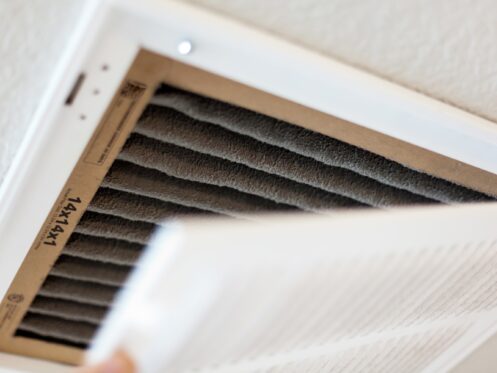If you are a homeowner in the Denver, CO, area, you rely on your HVAC system frequently to keep your home comfortable. This includes using your central air conditioning setup in the summer for cooling and your furnace in the winter for heating. There is an air filter that is part of your HVAC setup. It is used to remove particulates from your indoor air so that the air in your home is healthy for you and your family to breathe. Let’s look at the importance of your air filter and why replacing it periodically is an imperative step for heating and air conditioner maintenance.
Understanding the Importance of an Air Filter
There are several types of air filters that can be used in an HVAC system. This includes items like a simple fiberglass filter or a pleated variety. While these filters can be quite affordable, they don’t always do a great job of removing many contaminants from your indoor air. You can upgrade your filter type to something like a high-efficiency particulate air filter (HEPA) or a filter made with activated carbon. These filters often remove as much as 99.97% of the particulate matter that is passing through them. Unfortunately, not every HVAC system can handle the restriction in airflow that occurs with these higher-rated filters. We can advise you what type of filter is your best option for improving indoor air quality while protecting your HVAC equipment.
If you allow a high prevalence of dust and other debris to circulate in your home each day, this can lead to allergy symptoms, asthma attacks, respiratory illness, fatigue, headaches, and much more. It’s important to change your filter once every 30 to 90 days in most cases. The filter you use will explain the frequency with which you should conduct changes. You may also find information in the owner’s manual for your furnace or air conditioner.
Different Types of Air Filters
Let’s look at some of the options you have for HVAC system air filters. Not all types are compatible with all systems, so read on for the details on each type.
Synthetic / Fiberglass Filters
One of the most affordable filter options, fiberglass filters can usually catch about 80% of the particulates that are around 50 microns in size or larger and 25% of the particulates that are between 3 and 10 microns in size. This still leaves a lot of contaminants circulating in your home. These filters usually last anywhere from 30 to 90 days, but usually more towards the 30-day mark.
Polyester Filters
A slight upgrade from a fiberglass filter, a polyester filter can trap approximately 80% to 95% of particulate matter that is 5 microns or larger. It costs a bit more but needs to be replaced less frequently and does a better job.
Electrostatic Filters
Self-charging fibers attract particulates that are in your indoor air, trapping them before they can circulate through your ducts and into your home. Some of these filters come in washable versions, so you save a bit of money by not having to replace them often. Just make sure that you let your filter dry completely before you put it back into its housing. Otherwise, you could be promoting the growth of mold.
Pleated Filters
Because of their increased surface area, pleated filters can remove particulates that are as small as 0.3 microns in size. This includes some viruses and bacteria.
HEPA Filtration
A lot of furnaces and air conditioners aren’t capable of handling HEPA filters because of restricted airflow. However, many whole-house air purification units use this type of filter to remove as much as 99.97% of the particulate matter in your home, including contaminants that are as small as 0.3 microns in size.
Make sure that you’re using a properly sized air filter. If you use something that is too big or too small, this can cause dust and other debris to pass by your filter and back into your living spaces. It can also cause issues with your heating and cooling equipment.
What Happens When You Don’t Change Your Filter?
We’ve talked a bit about the prevalence of particulate matter in your air and how that can affect your health and well-being. Unfortunately, not changing your filter often enough can also contribute to issues with your HVAC machinery. When you have a clogged filter in your system, this can allow particulate matter to accumulate on the interior components of your heating and cooling equipment. This can cause parts to break, wear down, and experience issues. This leads to frequent repair needs, which can become costly.
Also, a dirty filter can decrease the overall efficiency of your heating and cooling equipment. You may see your energy bills start to rise if you’re neglecting to change your filter. Your systems may start to experience wear and tear that can shorten the duration of their lifespan. This will require you to replace your furnace or air conditioner more often, which can be quite expensive.
Your ductwork can also be impacted by a dirty air filter. Contaminants will accumulate on the interior surfaces of your ducting. This can lead to poor indoor air quality, corrosion, and even mold growth. We may need to clean your ductwork or maybe even repair and replace entire sections as time goes by if your HVAC filter isn’t changed often enough.
Reducing Your Carbon Footprint
When you aren’t replacing your filter on a regular basis, this can lead to damage to your HVAC equipment. When this happens, your system becomes inefficient. This can lead to the use of more energy, which increases your carbon footprint. By maintaining your HVAC system, you can reduce your energy consumption and protect the environment.
Improving the Smell of Your Home
When you have stale and contaminated air in your home, this can cause your indoor environment to smell musty, moldy, or just simply not clean. A clean filter can remove a large prevalence of particulates, resulting in fresher-smelling air. If you use a filter with activated carbon, this can further help reduce odors and improve indoor air quality. Activated carbon does a great job of removing cooking smells, pet odors, and even volatile organic compounds. The best part is you won’t have to open your windows and doors. This can help you minimize the amount of time that your HVAC equipment needs to run to keep your home at a comfortable temperature.
Call the Pros
If you would like to learn more about the importance of changing your HVAC filter and how often you should be doing so, reach out to us here at Summit Heating, A/C, Plumbing & Electrical. We can also help you improve your indoor air quality by installing a whole-house purification unit, whole-house humidity control, and UV light filtration. We also perform duct cleaning and duct sealing for an increase in efficiency and indoor air quality. Other services include the installation, repair, and maintenance of furnaces and air conditioners. Our team provides plumbing and electrical services as well.
Contact Summit Heating, A/C, Plumbing & Electrical in Denver to learn more about your filters or to schedule an appointment.


